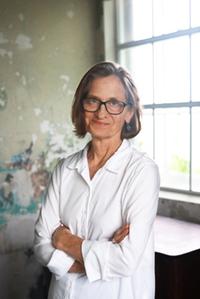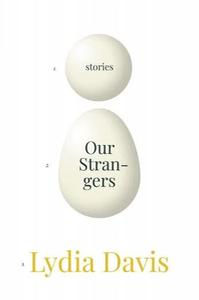
|
|
| photo: Theo Cote | |
Lydia Davis is the author of one novel, many collections of stories, two books of essays, and numerous translations from French and other languages. Her ninth work of fiction, Our Strangers (Bookshop Editions, October 3, 2023), is a collection of 143 stories, some only a paragraph in length, or an exchange of a few lines of dialogue.
Handsell readers your book in approximately 25 words or less:
This new collection of stories contains fiction from the past nine years. Most of them very brief, but some are longer and more traditional. Most were enjoyable to write (some painful), and I still smile at some.
On your nightstand now:
My (remote) book club is just now embarking on the works of the 18th-century English rural poet John Clare (a contemporary of Keats). I look forward to taking some time over each poem and enjoying the language of a different century, especially as the subjects are often the wildlife and countryside he knew so well.
We just finished reading Poverty, by America by Matthew Desmond, which is an essential call to action and self-examination on the part of those readers with any degree of affluence at all.
On my own, as a result of trying to divest possessions, I am eliminating books in my library and in the process exploring unread books that have sat on my shelves for many years. One is the very well-written and closely observed A Voice Through a Cloud by Denton Welch, an eccentric autobiographical novel about a long recovery from a disabling bicycle accident. At the same time, I'm reading--for the second time--How to Resist Amazon and Why by Danny Caine, a newly revised and updated version. It reveals with well-researched facts and passionate commitment even more about the appalling business practices and worker treatment of this destructive behemoth!
And very absorbing to me at present, because of my interest in attempts to restore our natural environment, is an English book dating back to the years after World War II. From the Waste Land by Edward Hyams is a detailed account of the arduous and adventurous project he undertook, together with his wife, of converting a plot of waste land into a productive garden-vineyard, with active help and intervention from local neighbors. He offers many strong political comments along the way, generally in favor of socialism and against capitalism!
Favorite book when you were a child:
There were many--I was a great reader. Most will not be surprising. The Secret Garden, Little Lord Fauntleroy, and others by Frances Hodgson Burnett; The Princess and the Goblin and The Princess and Curdie by George MacDonald; Hans Brinker, or the Silver Skates by Mary Mapes Dodge; Heidi by Johanna Spyri; The Good Master by Kate Seredy (set in Hungary, starring a wildly rebellious girl). Not to mention all the C.S. Lewis and Tolkien books.
Your top five authors:
That is as difficult as asking for my top five composers. Longstanding and influential favorites, of course, are Kafka, Beckett, and Joyce. More recent (though still longstanding) would be Grace Paley, Lucia Berlin, and Jane Bowles, among many others. Also Barbara Pym for sheer enjoyment. Then there are Thomas Bernhard, Peter Handke, W.H. Hudson (early-20th-century nature writer), Ali Smith, Flannery O'Connor, Chekhov. And a long list of poets, classics and contemporary, also essential for a prose writer.
Book you've faked reading:
I am, unfortunately, painfully honest, as a rule. But I have been guilty sometimes of remaining silent when the conversation turns to a book or author I feel I "should have" read, though I've found that as you get older, you just don't mind admitting things as much as you might have when you were young. If you haven't read certain books, you've done other things instead.
 Book you're an evangelist for:
Book you're an evangelist for:
For a long time--years and years, decades--I urged people to read Lucia Berlin. Now that she has died, she has a wide readership. I'm glad people are reading her--she's very good. (She wasn't ambitious for fame and glory when she was alive, but she hoped her children might benefit after she was gone. Wonderful person.)
Book you've bought for the cover:
I can't think of any! I might open a book because of the cover, but not necessarily buy it. Long ago, the books published by the French publisher Gallimard all had the same cover design--simple, identifiable. A cream-colored background with contrasting border lines at the edges, typeface with title and author--that was it. You learned about the book through reviews and word-of-mouth, maybe took a peek at it in a bookstore, decided you were interested, or not. That was certainly more straightforward and less complicated for the publisher--the reader wasn't enticed to buy, but bought according to the content only.
Book you hid from your parents:
I don't remember hiding any books from them--except when I stayed up late reading with a flashlight under the covers.
Book that changed your life:
Another difficult question. If you're a reader and you think about what you read, every book has an effect, and the best ones have a subtle but ongoing and important effect--it's hard to measure. The most recent one that opened my eyes to another world and another concept was Metazoa by Peter Godfrey-Smith. It is about other creatures'--especially sea creatures'--degrees of awareness and self-consciousness, greater than you would expect.
Favorite line from a book:
I don't have a favorite. The sentence that obsessed me the most and that I struggled over (as a translator) was the famous first one in Proust's Swann's Way, simple though it seems: "For a long time I went to bed early." Oh, another I like that I read recently was from Tolstoy's Last Diaries: "and, while I cannot say I thought, ideas wandered through my head." I would rephrase it: "And though I can't say I was thinking, ideas were wandering through my head." We often remember things the way we prefer to have them.
Five books you'll never part with:
I am presently winnowing my library down to the books I'm glad to have in the house. The next culling will get closer to the books I'll never part with--too many to name. I won't be able to take them to the grave with me, but they'll still be there when I die!
Book you most want to read again for the first time:
I recently regretted having read all of Barbara Pym's novels, because I envied a friend who was reading one of them for the first time, but since, in the case of most books, I remember only about 5% of what I read, I could happily read all my favorites again--and probably will. Specifically, one of the first will be Moby-Dick.

